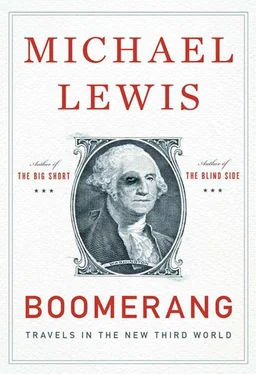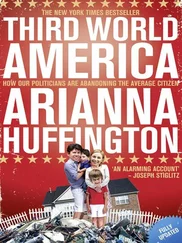This marvelous training was as fresh in his mind as if he’d received it yesterday, and the thought of it makes his eyes mist.
“You spent seven years learning every little nuance of the fishing trade before you were granted the gift of learning from this great captain?” I ask.
“Yes.”
“And even then you had to sit at the feet of this great master for many months before you felt as if you knew what you were doing?”
“Yes.”
“Then why did you think you could become a banker and speculate in financial markets without a day of training?”
“That’s a very good question,” he says. He thinks for a minute. “For the first time this evening I lack a word.” As I often think I know exactly what I am doing even when I don’t, I find myself sympathetic.
“What, exactly, was your job?” I ask, to let him off the hook, catch and release being the current humane policy in Iceland.
“I started as a . . .”—now he begins to laugh—“an adviser to companies on currency risk hedging. But given my aggressive nature I went more and more into plain speculative trading.” Many of his clients were other fishermen, and fishing companies, and they, like him, had learned that if you don’t take risks you don’t catch the fish. “The clients were only interested in ‘hedging’ if it meant making money,” he says, and begins to laugh hysterically.
“Did you even like banking?” I ask.
“I never had any respect for bankers,” he says, still gasping for breath. “To this day one of my favorite phrases is: never trust a banker .”
IN RETROSPECT, THERE are some obvious questions an Icelander living through the past five years might have asked himself. For example: Why should Iceland suddenly be so seemingly essential to global finance? Or: Why do giant countries that invented modern banking suddenly need Icelandic banks to stand between their depositors and their borrowers—to decide who gets capital and who does not? And: If Icelanders have this incredible natural gift for finance, how did they keep it so well hidden for 1,100 years? At the very least, in a place where everyone knows everyone else or his sister, you might have thought that the moment Stefan Alfsson walked into Landsbanki ten people would have said, “Stefan, you’re a fisherman!” But they didn’t. To a shocking degree, they still don’t. “If I went back to banking,” says the Icelandic cod fisherman, now wearing an entirely straight face, “I would be a private-banking guy.”
BACK IN 2001, as the Internet boom turned into a bust, MIT’s Quarterly Journal of Economics published an intriguing paper called “Boys Will Be Boys: Gender, Overconfidence, and Common Stock Investment.” The authors, Brad Barber and Terrance Odean, gained access to the trading activity in over 35,000 households, and used it to compare the habits of men and women. What they found, in a nutshell, is that men not only trade more often than women but do so from a false faith in their own financial judgment. Single men traded less sensibly than married men, and married men traded less sensibly than single women: the less the female presence, the less rational the approach to trading in the markets.
One of the distinctive traits about Iceland’s disaster, and Wall Street’s, is how little women had to do with it. Women worked in the banks, but not in the risk-taking jobs. As far as I can tell, during Iceland’s boom, there was just one woman in a senior position inside an Icelandic bank. Her name is Kristin Pétursdóttir, and by 2005 she had risen to become deputy CEO for Kaupthing in London. “The financial culture is very male-dominated,” she says. “The culture is quite extreme. It is a pool of sharks. Women just despise the culture.” Pétursdóttir still enjoyed finance. She just didn’t like the way Icelandic men did it, and so, in 2006, she quit her job. “People said I was crazy,” she says, but she wanted to create a financial services business run entirely by women. To bring, as she puts it, “more feminine values to the world of finance.”
Today her firm is, among other things, one of the very few profitable financial businesses left in Iceland. After the stock exchange collapsed, the money flooded in. A few days before we met, for instance, she heard banging on the front door early one morning and opened it to discover a little old man. “I’m so fed up with this whole system,” he said. “I just want some women to take care of my money.”
It was with that in mind that I walked, on my last afternoon in Iceland, into the Saga Museum. Its goal is to glorify the Sagas, the great twelfth- and thirteenth-century Icelandic prose epics, but the effect of its life-size dioramas is more like that of modern reality TV. Not statues carved from silicone but actual ancient Icelanders, or actors posing as ancient Icelanders, as shrieks and bloodcurdling screams issue from the PA system: a Catholic bishop named Jón Arason having his head chopped off; a heretic named Sister Katrin being burned at the stake; a battle scene in which a blood-drenched Viking plunges his sword toward the heart of a prone enemy. The goal was verisimilitude, and to achieve it no expense was spared. Passing one tableau of blood and guts and moving on to the next, I caught myself glancing over my shoulder to make sure some Viking wasn’t following me with a battle-ax. The effect was so disorienting that when I reached the end and found a Japanese woman immobile and reading on a bench, I had to poke her on the shoulder to make sure she was real.
This is the past Icelanders supposedly cherish: a history of conflict and heroism. Of seeing who is willing to bump into whom with the most force. There may be plenty of women in it, but it is chiefly a history of men.
When you borrow a lot of money to create a false prosperity, you import the future into the present. It isn’t the actual future so much as some grotesque silicone version of it. Leverage buys you a glimpse of a prosperity you haven’t really earned. The striking thing about the future the Icelandic male briefly imported was how much it resembled the past that he celebrates. I’m betting now they’ve seen their false future the Icelandic female will have a great deal more to say about the actual one.
II

AND THEY INVENTED MATH
After an hour on a plane, two in a taxi, three on a decrepit ferry, and then four more on buses driven madly along the tops of sheer cliffs by Greeks on cell phones, I rolled up to the front door of the vast and remote monastery. The spit of land poking into the Aegean Sea felt like the end of the earth, and just as silent. It was late afternoon, and the monks were either praying or napping, but one remained on duty at the guard booth to greet visitors. He guided me along with seven Greek pilgrims to an ancient dormitory, beautifully restored, where two more solicitous monks offered ouzo, pastries, and keys to cells. I sensed something missing, and then realized: no one had asked for a credit card. The monastery was not merely efficient but free. One of the monks then said the next event would be the church service: Vespers. The next event, it will emerge, will almost always be a church service. There were thirty-seven different chapels inside the monastery’s walls; finding the service is going to be like finding Waldo, I thought.
“Which church?” I asked the monk.
“Just follow the monks after they rise,” he said. Then he looked me up and down more closely. He wore an impossibly long and wild black beard, long black robes, a monk’s cap, and prayer beads. I wore white running shoes, light khakis, and a mauve Brooks Brothers shirt and carried a plastic laundry bag that said EAGLES PALACE HOTEL in giant letters on the side. “Why have you come?” he asked.
Читать дальше













